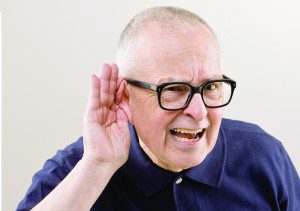By Dr. Noël Crosby, Au.D.
 May is Better Hearing and Speech month which presents a great opportunity to talk about recognizing hearing loss and its associated symptoms. Many times hearing loss is a gradual process, the departure of your ability to hear well can go unnoticed. You may think that people are mumbling more, your spouse needs to speak up, or the telephone is not working correctly. As long as some sound still comes in, you may assume that your hearing is fine. Some people may not realize that they have hearing loss, especially if it develops over a number of years or if it happens in one ear. Some of the common experiences where people begin to notice changes to their hearing include: In the early stage of hearing loss, high-pitched sounds, such as a child’s or a females voice are more difficult to understand and hear, and the sounds “S” and “F” become harder to distinguish from each other, Other symptoms of hearing loss include:
May is Better Hearing and Speech month which presents a great opportunity to talk about recognizing hearing loss and its associated symptoms. Many times hearing loss is a gradual process, the departure of your ability to hear well can go unnoticed. You may think that people are mumbling more, your spouse needs to speak up, or the telephone is not working correctly. As long as some sound still comes in, you may assume that your hearing is fine. Some people may not realize that they have hearing loss, especially if it develops over a number of years or if it happens in one ear. Some of the common experiences where people begin to notice changes to their hearing include: In the early stage of hearing loss, high-pitched sounds, such as a child’s or a females voice are more difficult to understand and hear, and the sounds “S” and “F” become harder to distinguish from each other, Other symptoms of hearing loss include:
• Difficulty hearing on the telephone
• Difficulty understanding speech when there is background noise ( in restaurants, crowds or parties)
• Difficulty following a conversation when two or more people are talking at once
• Misunderstanding what other people are saying and responding inappropriately
• Misunderstanding words that sound similar
• Asking people to repeat what they said or speak more slowly, loudly, and clearly
• Difficulty understanding the speech of women and children, which is generally higher pitched
• Getting complaints from others that you have the TV or radio volume too high
• Withdrawing from conversations because you have
trouble hearing
• Decreased ability to hear any of the following:
– Higher pitched sounds
– Lower pitched sounds
– All sounds
– Speech when there is background noise
• Dizziness
• Ringing, hissing, or roaring sounds in the ears (tinnitus)
• Some sounds seem too loud
• Problems with balance
• Ear pain
• Feeling of fullness or pressure in the ear
Doctors classify hearing loss by degrees. With mild hearing loss, one-on-one conversations are fine but it becomes hard to catch every word when background noise is present. With moderate hearing loss, you often need to ask people to repeat themselves when speaking in-person and on telephone conversations. With severe hearing loss, following a conversation is almost impossible without a hearing aid. Those who have profound hearing loss cannot hear other people speaking unless they are extremely loud. Without a hearing aid or some type of assistive listening device you cannot understand speech. As these stages progress, the person with hearing loss can become increasingly cut off from the world of speech and sounds.
Hearing loss treatment depends on the type and source of hearing loss. Surgery may reverse hearing loss caused by otosclerosis, scar tissue, or infection while Meniere’s disease is sometimes treatable with medication and diet modification. Hearing loss caused by infection can sometimes be treated with antibiotics. If you think your hearing loss is caused by medication use, speak to your doctor about possible alternative drug options. Prompt medical treatment for sudden hearing loss may increase the chance of recovery.
People with permanent hearing loss need to learn how to function with the hearing they still have. Most people with hearing loss can benefit from using a hearing aid. There are other sound enhancing technologies that allow you to tune in to what you want to hear and mute other sounds. TV-listening systems make it possible for you to hear the television or radio without turning the volume way up. Different kinds of phone-amplifying devices are available that make conversations possible on home and mobile phones.
Finally cochlear implants are being used on children and adults with profound hearing loss. Prevention is your best path to healthy long-term hearing. Always wear some form of ear protection when you’re exposed to loud noise. Lawn mowers, power equipment, vacuums, and most music concerts are all loud enough to harm unprotected ears. Whenever possible, remove yourself from the source of the loud noise. Work with your family and friends to re-establish two-way communication. For example, set up your home so that your rooms are well lit and the chairs face each other. The ability to see the faces of people when they talk allows you to see their mouths move as well as their facial expressions. If possible, remove sources of background noise; for example, turn off the television when no one’s watching it. Always let people know that they should make sure they have your attention before they start talking and to also make sure you can see their lips moving when they talk.
Special offer to Promote Better Hearing & Speech Month
Limited Time slots available
throughout the Month.
FREE Hearing Screening with a
Mini Consultation. ($ 45.00-value)
Call Today to make your appointment 941-474-8393
PROFESSIONAL BIO
Dr. Noël Crosby, Au.D., owner and audiologist at Advanced Hearing Solutions in Englewood, FL is a licensed professional whose 26 year career has been devoted to helping people of all ages hear and understand more clearly. Dr. Crosby received her BS and MS degrees from FSU and her Doctorate in Audiology from UF. Her credibility as an authority grew during her tenure as the Director of Audiology at the Silverstein Institute in Sarasota, FL from 1991-1998. Today, in addition to managing a successful audiology practice, Dr. Crosby is involved in creating hearing loss awareness through her jewelry and accessory company AuDBling.com. She has served and is serving on various professional boards and committees and was president of the Florida Academy of Audiology in 2000 and 2010. She has been married to Michael for 23 years and has one daughter.







